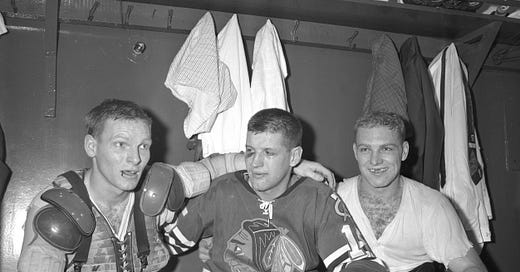Remembering Eric Nesterenko (1933-2022)
Eric Nesterenko won a Stanley Cup with the Chicago Blackhawks in 1961 in a professional career that spanned from 1951 to 1976.
I was saddened to hear the passing this week of Eric Nesterenko at the age of 88. Nesterenko was always someone I could call up to chat hockey, and talk about the old days with as he was very generous with his time. I just wish I had taken him up on his offer to go skiing with him in Vail, Colorado! Here is a piece I had written on Eric for my past book…
Keep reading with a 7-day free trial
Subscribe to NHL History with Ty Di Lello to keep reading this post and get 7 days of free access to the full post archives.



